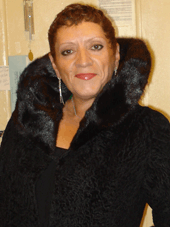
 Many people find it very difficult to imagine their parents having sex. As difficult as that may seem, it is probably even harder to imagine their grandparents being sexual. This is just one example of the complexities of sexuality. Most depictions of sex, especially those referencing sexually transmitted infections (STIs) and the need for protection, are of young people. This topic, however, must quickly become part of our national discourse on aging in order to keep older adults healthy.
Many people find it very difficult to imagine their parents having sex. As difficult as that may seem, it is probably even harder to imagine their grandparents being sexual. This is just one example of the complexities of sexuality. Most depictions of sex, especially those referencing sexually transmitted infections (STIs) and the need for protection, are of young people. This topic, however, must quickly become part of our national discourse on aging in order to keep older adults healthy. Many older adults, especially those who have experienced divorce or the death of a partner, don't perceive themselves to be at risk for infections like HIV. Women past child-bearing age often don't think they need to use protection during sex, since pregnancy is no longer a concern. Doctors rarely ask older adults about their sexual health or activity, and gay men are especially unlikely to discuss sexual activity with a doctor. In New York City, half of all men over 50 who were diagnosed with HIV in 2007 did not report how they became infected. Clearly, there is widespread and dangerous silence about sexual activity and HIV amongst older adults.
According to the most recent Centers for Disease Control and Prevention (CDC) estimate, by 2015, more than half of all people living with HIV in the U.S. will be over 50 years of age. This projection is partly due to the scientific advances in treatment that allow those living with HIV to live longer, healthier lives. However, it is also due to the number of new HIV infections among people aged 50 or older. What is most troubling about this trend is that the likelihood that someone will be "dually diagnosed" with AIDS at the time of their HIV diagnosis rises dramatically with age. This means that people may be living longer and unknowingly HIV-positive. This is concerning from both an individual's treatment and a public health perspective.
Unfortunately, little medical expertise exists on HIV and aging. Physicians with an expertise in both geriatrics and HIV are extremely rare, and the geriatric infrastructure in the U.S. is wholly unprepared to face this epidemic. There is almost no federal research on how HIV treatment affects aging bodies, or the modes of HIV transmission amongst people over 50. No CDC-supported prevention model for older adults currently exists, nor does a federal testing campaign. The necessary HIV prevention conversations may be uncomfortable for some, and HIV stigma may deter older adults from testing. Nonetheless, these initiatives are desperately needed.
The lack of knowledge about HIV in geriatric care has led to extensive discrimination. In 2009, an assisted living facility in Little Rock, Ark. evicted a 70-year-old retired professor and minister, Dr. Robert Franke. Although this facility, Fox Ridge, advertised "round-the-clock care" for its residents, this promise rang hollow for Dr. Franke. After a lengthy paperwork process to describe his medical history, Dr. Franke moved into the facility from Michigan, hoping to finally live nearer to his daughter. The next day, when Fox Ridge staff noticed in his paperwork that he was HIV-positive, he was asked to leave. A lawsuit helped by Lambda Legal eventually settled out of court in September 2010, but the case raised awareness about the needs of older adults living with HIV. Dr. Franke and his daughter, Sara Bowling, were recognized for their fight against HIV discrimination and spoke about their experiences at an October 2010 White House meeting on HIV and aging. Slowly, thanks to advocates like the Frankes, this long-ignored public health issue is being addressed. But there is still much that needs to be done before HIV-positive elders receive the full care and attention they deserve.
The CDC can spearhead efforts for better care and prevention by collecting data on HIV amongst older adults, the effects of HIV treatment on aging, and the prevalence of HIV in gay and bisexual men and transgender women over 50. This research could inform a CDC prevention campaign, part of which should be a social marketing campaign to end HIV stigma and anti-gay stigma in nursing homes and senior centers. As part of this effort, staff at nursing homes and senior centers should be thoroughly educated in the unique needs of older adults living with HIV, particularly those who identify as LGBT. Doctors should also be encouraged to talk to their patients over 50 about sexual health and activity, making it clear that those conversations are confidential. As uncomfortable as it may be, medical providers have to embrace that their older patients are having sex.
Congress can play a crucial role in implementing these programs through the reauthorization of the Older Americans Act (OAA). This piece of legislation allocates funding "for community planning and social services, research and development projects, and personnel training in the field of aging." The OAA must be reauthorized in 2011 for implementation in 2012, and Congress could include funding to address HIV care and prevention services. The OAA could also include LGBT elders and those living with HIV as "populations of greatest social need" for more targeted programming. As the epidemic changes, our federal response must adapt.
Many things come with age, but HIV doesn't have to be one of them.
Learn more about HIV and aging at GMHC's website, and read our in-depth report, "Growing Older with the Epidemic."
The article was originally published in the Huffington Post, as part of a new section, "Gay Voices," on September 28, 2011

